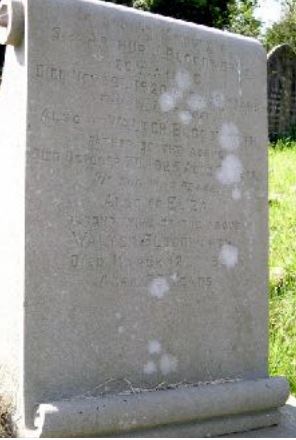Royal Engineers (Tunnelling Company Depot)

Arthur James Bloodworth was the son of Walter and Elizabeth Bloodworth and was born at Dursley either in the last weeks of 1881 or early in 1882.
He was a carpenter by trade, with King & Co in Gloucester and it was that trade that he took into the Army, when he enlisted on 20 September 1900 at West Down Camp, near Salisbury. He was aged 18 years and nine months on enlistment and had been serving in the Militia, with the 3rd Gloucesters, from 26 July to 9 September 1900.
He was posted to the Royal Engineers, as a Sapper and gradually achieved promotion within the non-commissioned ranks, becoming a Lance Corporal on 3 May 1901, Corporal on 20 August 1908 and Serjeant on 8 January 1913. During this time he extended his commitment to service on more than one occasion and pursued his trade as a carpenter.
Both his Service and Pension records have survived and these reveal his service was at Home from 20 September 1900 to 14 November 1904, after which he was in Gibraltar from 18 November 1904 to 3 October 1910. After this it was a return to the UK on 4 October 1910, where he served until 8 January 1914. The 1911 Census reveals that in March of that year he was with 10th Railway Company at Longmoor Camp, East Liss in Hampshire. It was a return to sunnier climes on 9 January 1914, with a posting to Malta and he did not return to the UK until 30 December 1914. His next overseas posting was on 3 March 1915, when his unit joined up with the British Expeditionary Force (BEF) in France. He was to spend the remainder of the Great War with the BEF and did not in fact return home until 20 March 1919.
On 21 October 1919 he was discharged from the Army as no longer physically fit for service. The exact nature of his discharge is not known but his obituary in the Dursley Gazette of 13 November 1920 said that he ‘died of paralysis of the back caused by shock while on active service’. He was granted a disability pension and given a Silver War Badge, to indicate that he was a serviceman discharged due to physical disability. His conduct in almost twenty years service was described as exemplary. Notwithstanding the above, his Pension Record Card (released via Ancestry in late 2018) notes that his discharge was due to ‘general paralysis (insanity)’, which had been aggravated by his military service and his address being the County Asylum, Gloucester. He was granted a 100% disability pension (40 shillings (£2) per week) in November 1920, which ran to then end of the quarter in which he died.
Arthur Bloodworth died at Gloucester on 9 November 1920, aged 38. A single man, he was buried in a Woodmancote (St Mark) Churchyard, where his grave is marked by a private stone headstone. Later his remains were joined by those of his father and his second wife.
Researched by Graham Adams 23 December 2018 (revised)
(Thanks to David Wood, of Dursley, for providing some information from ‘Dursley 1914-18 — study of a small town at war’ by David Evans)
